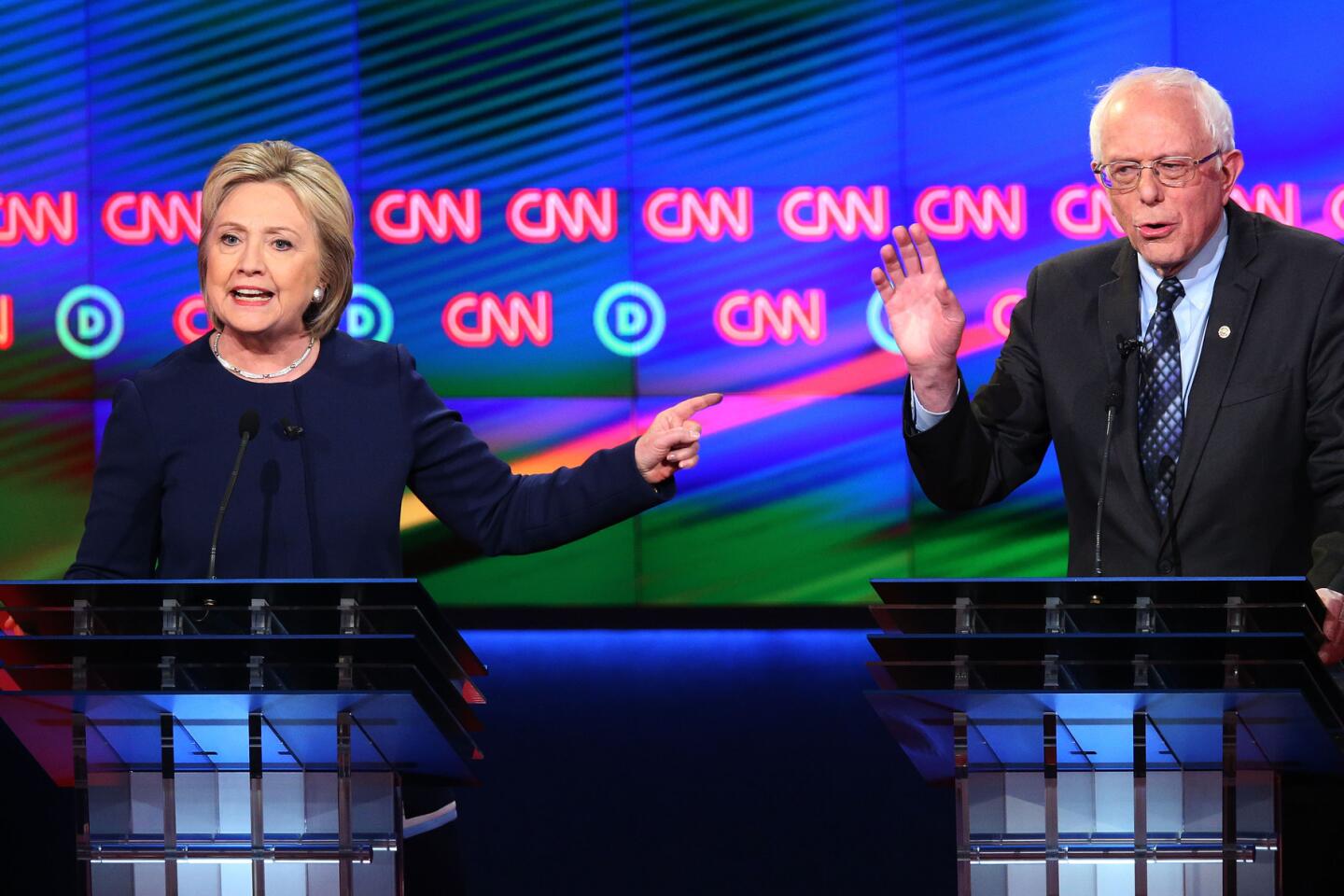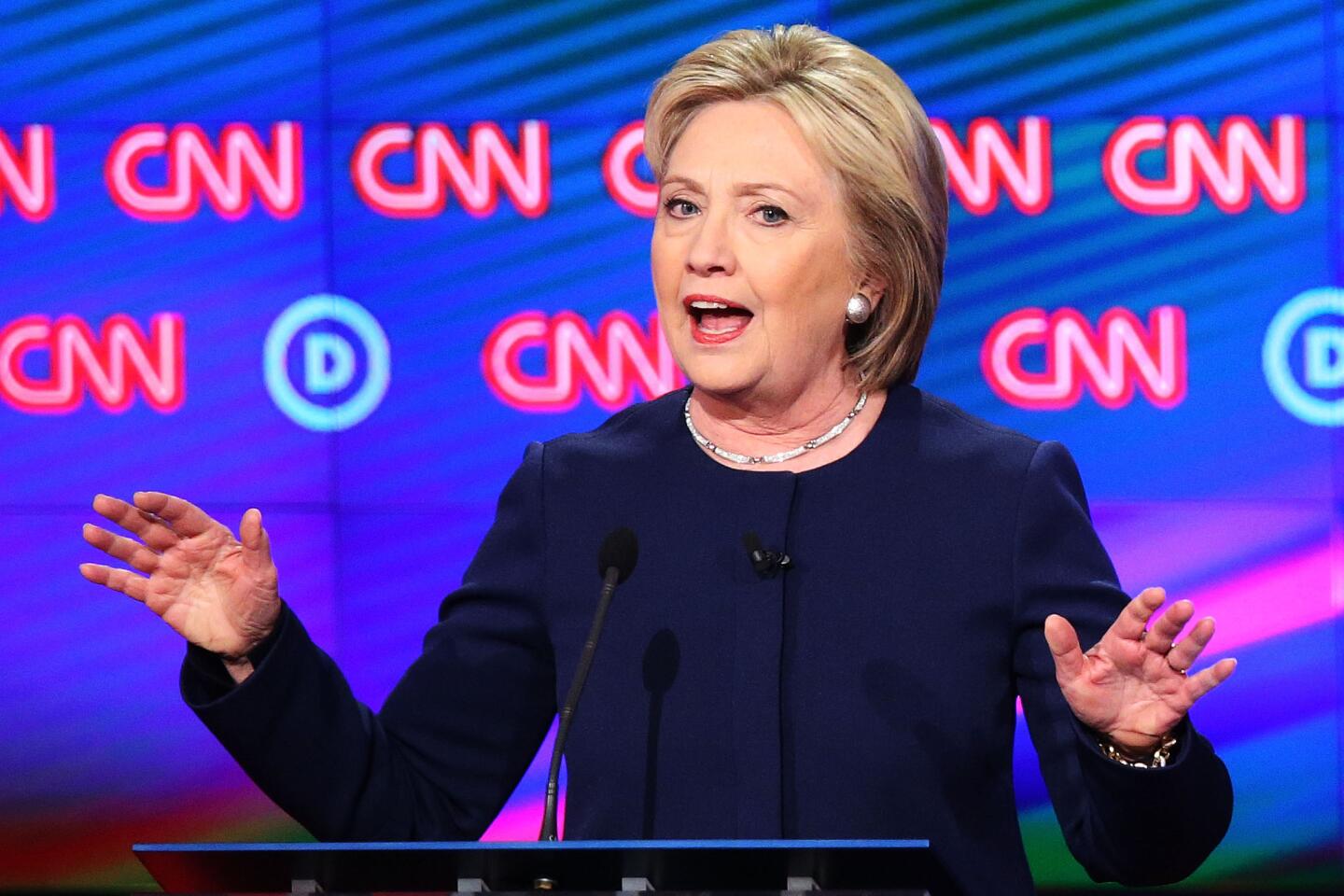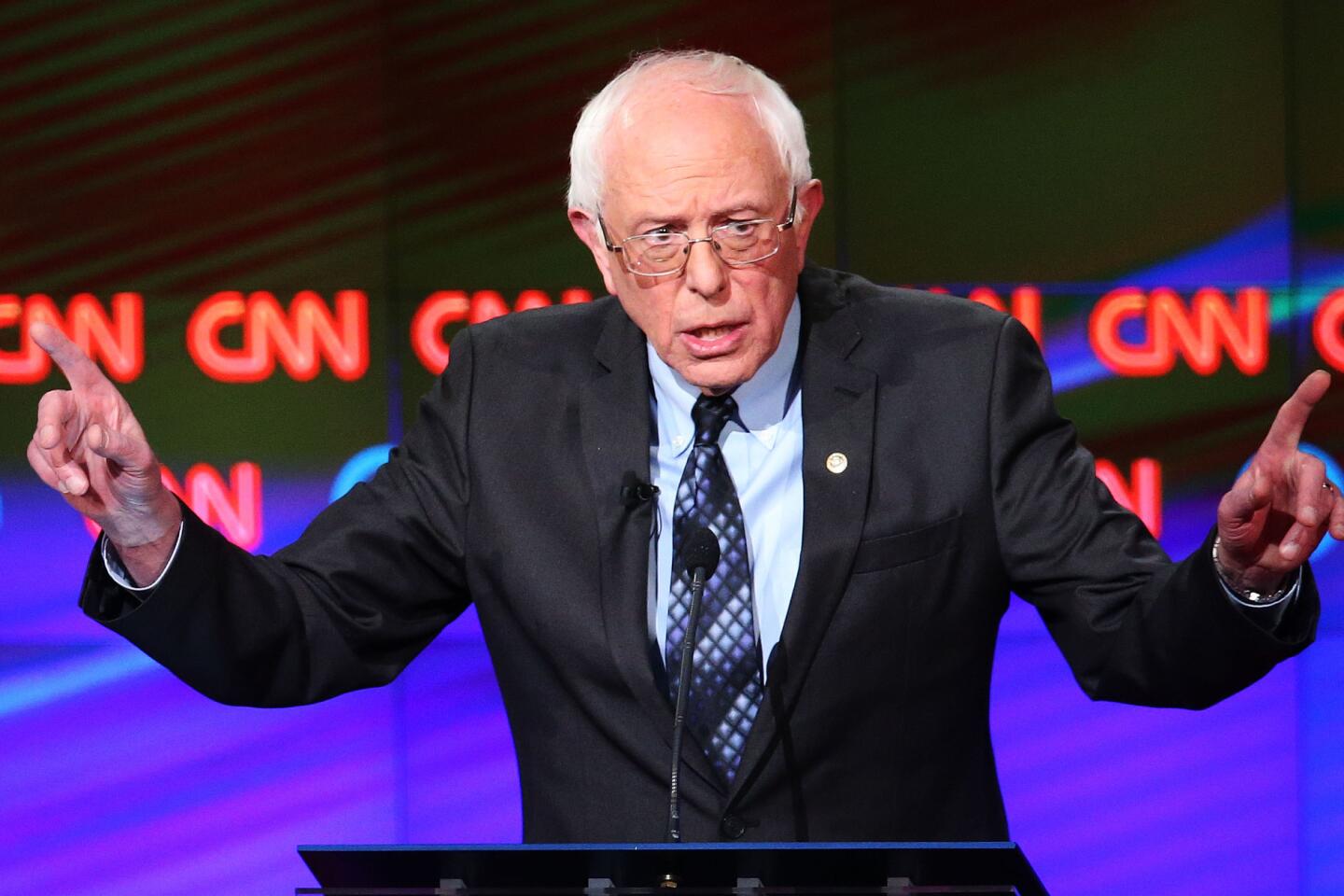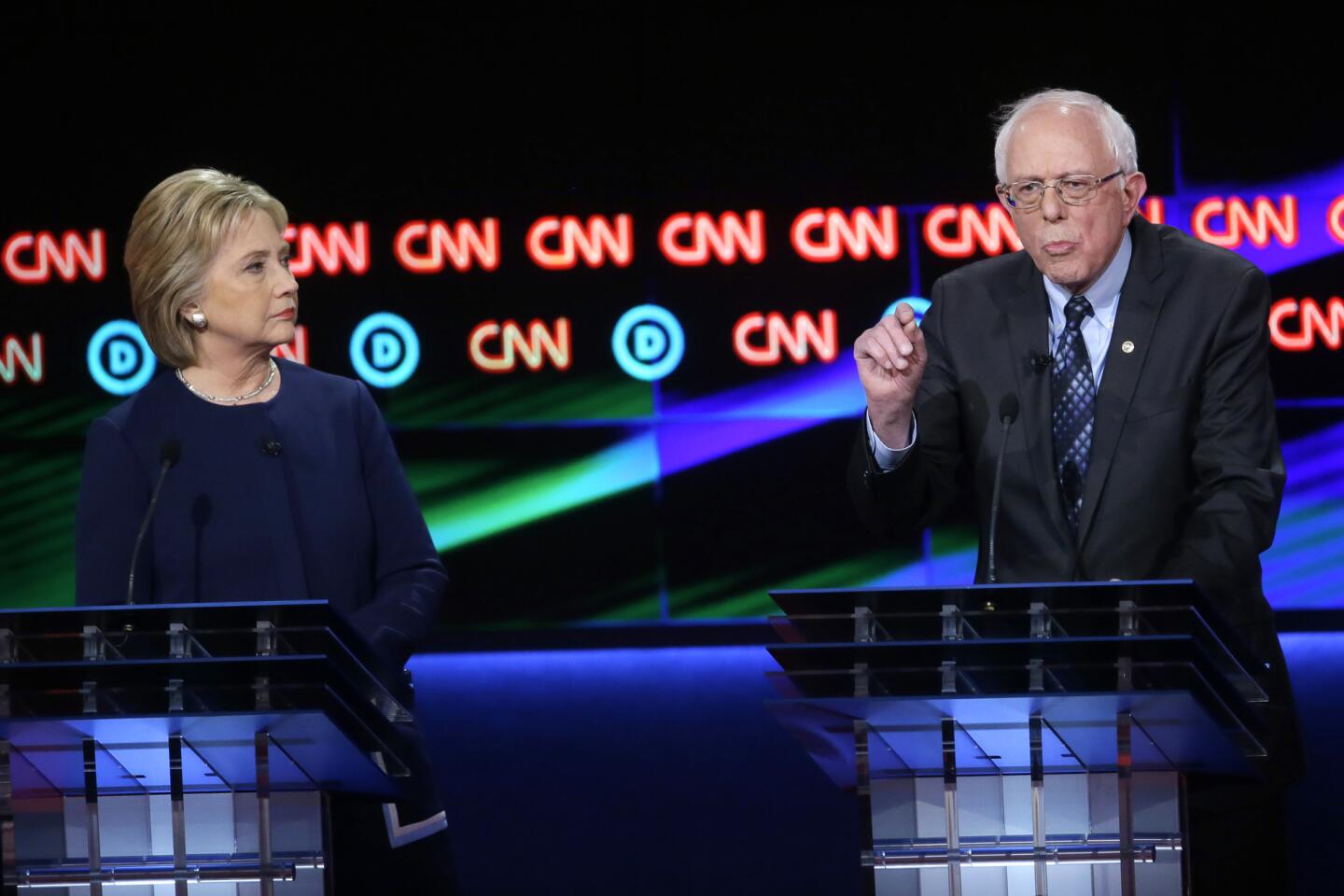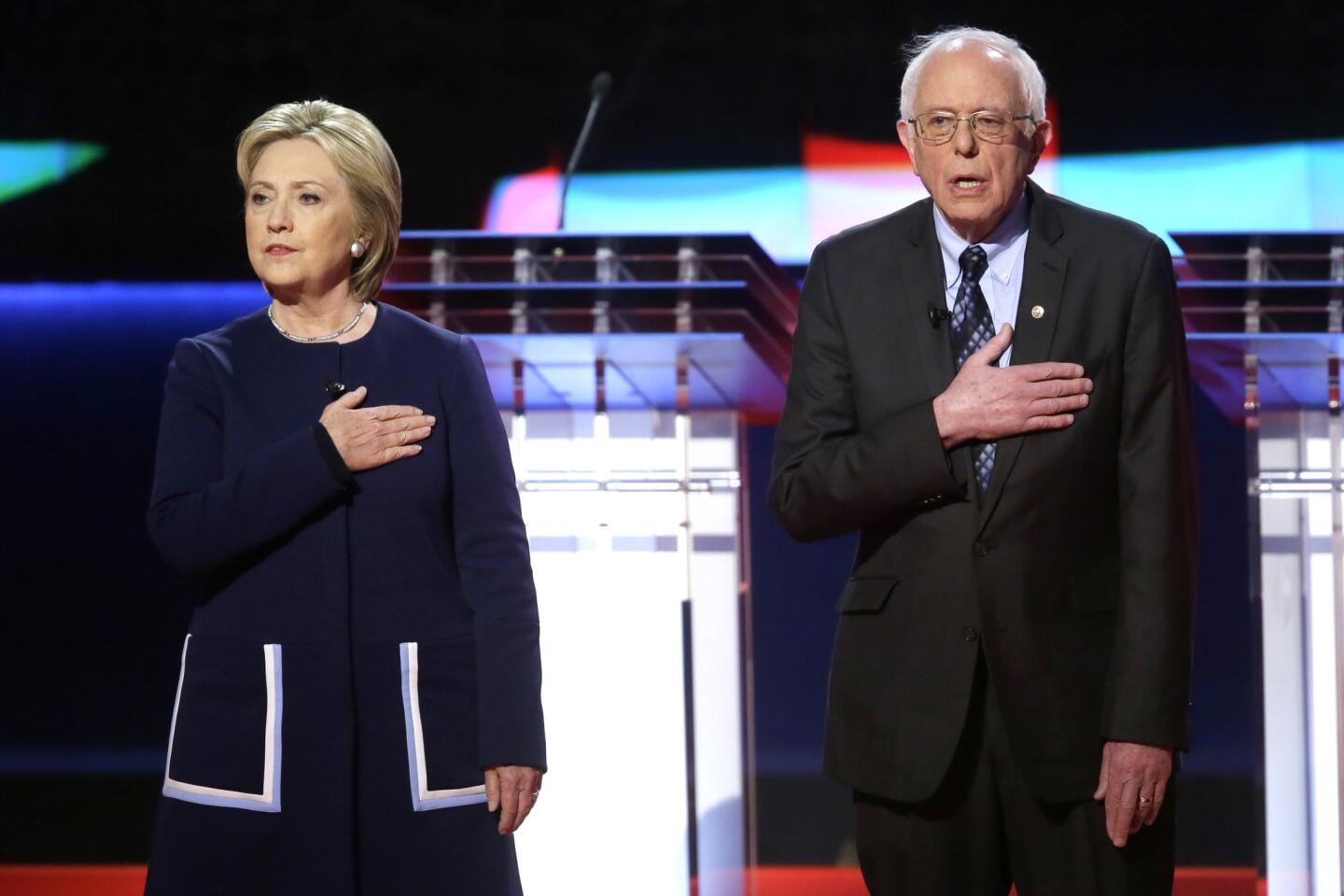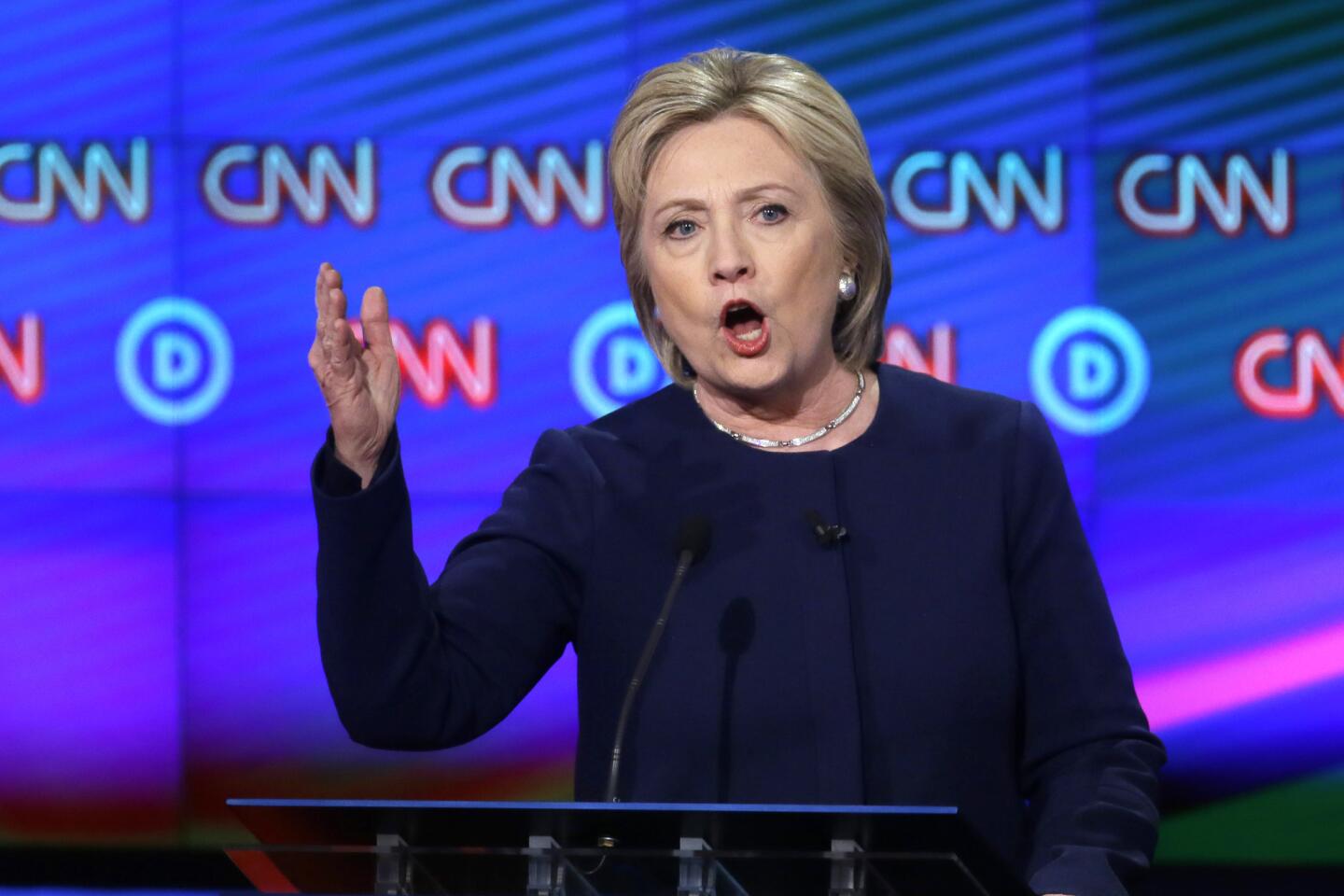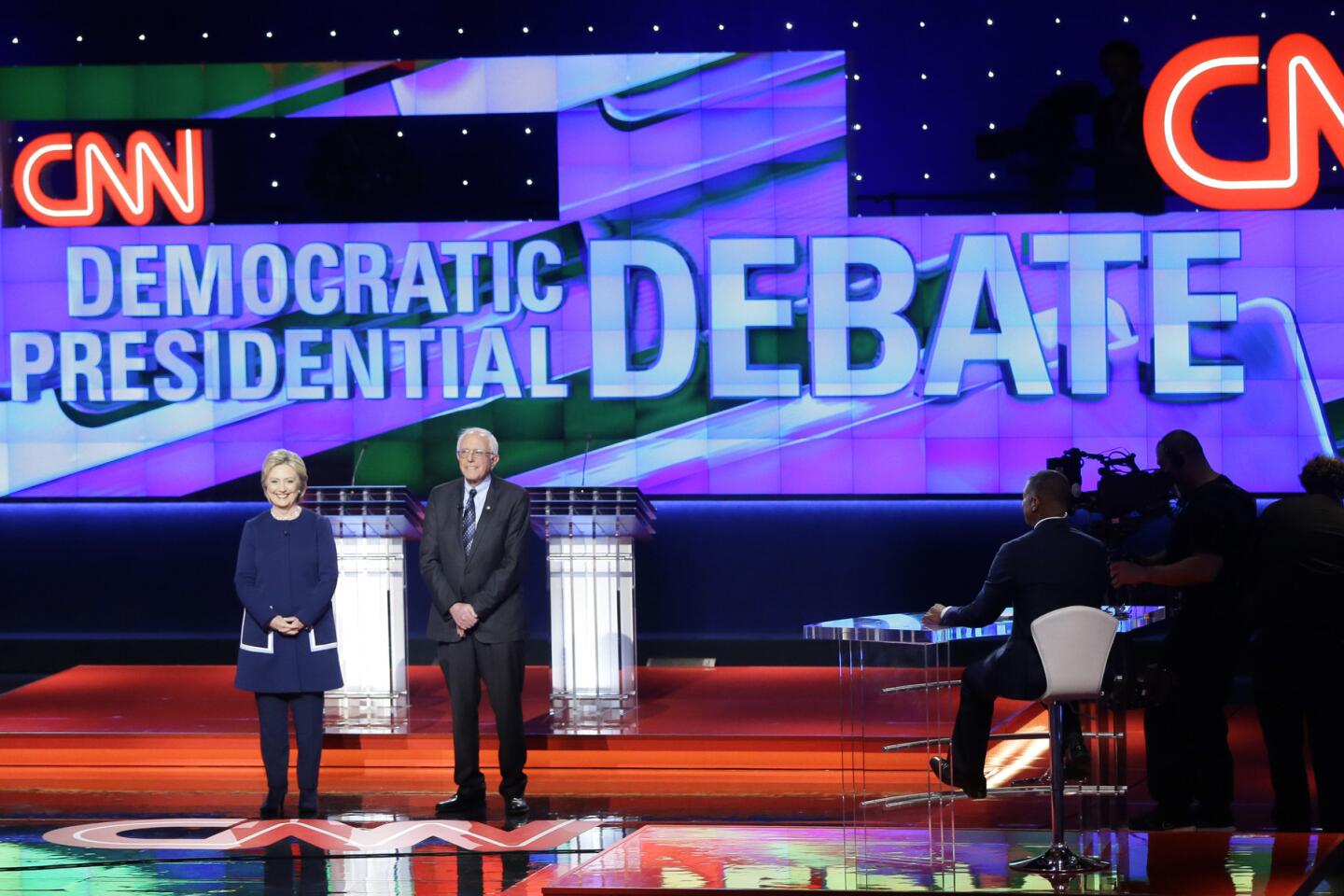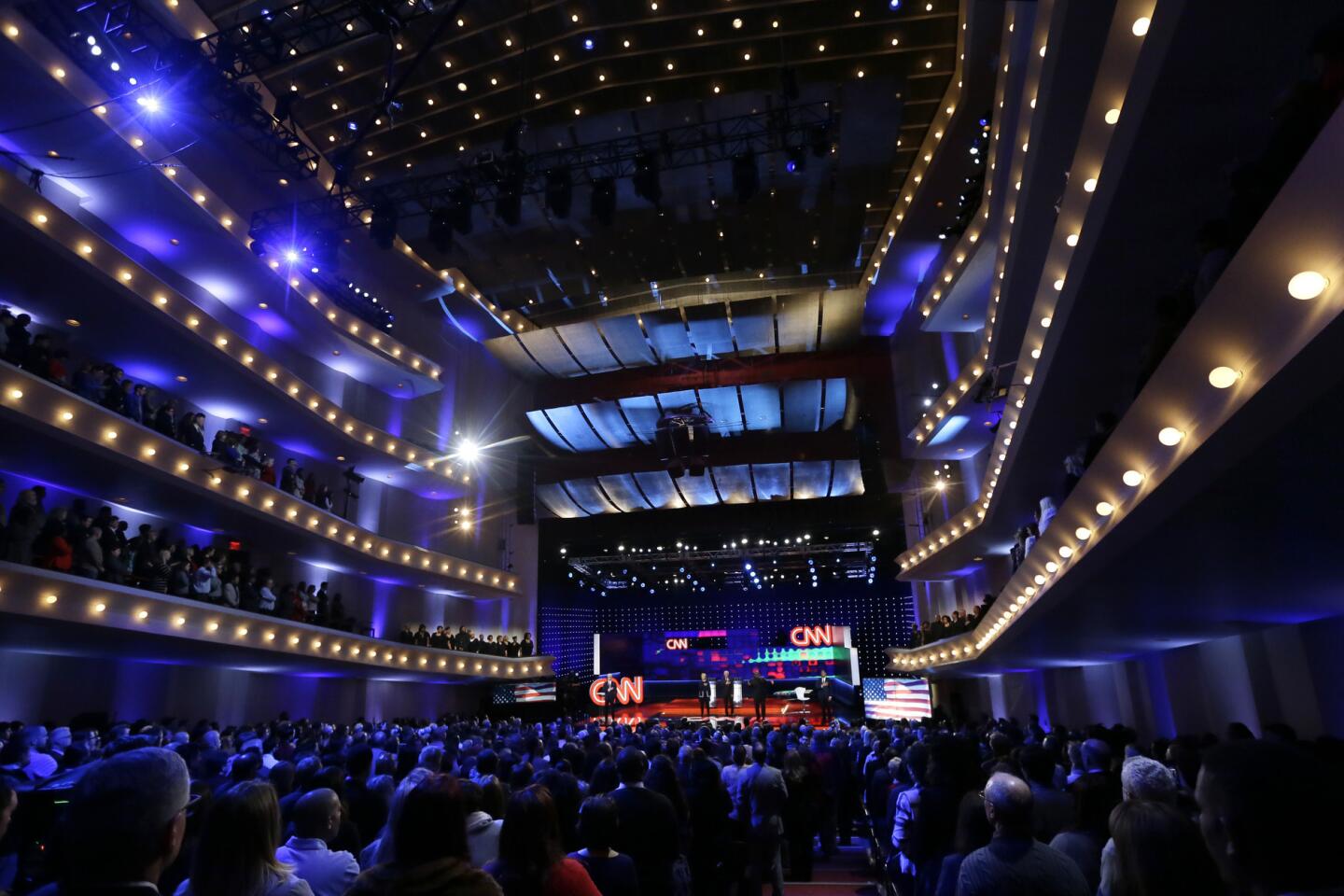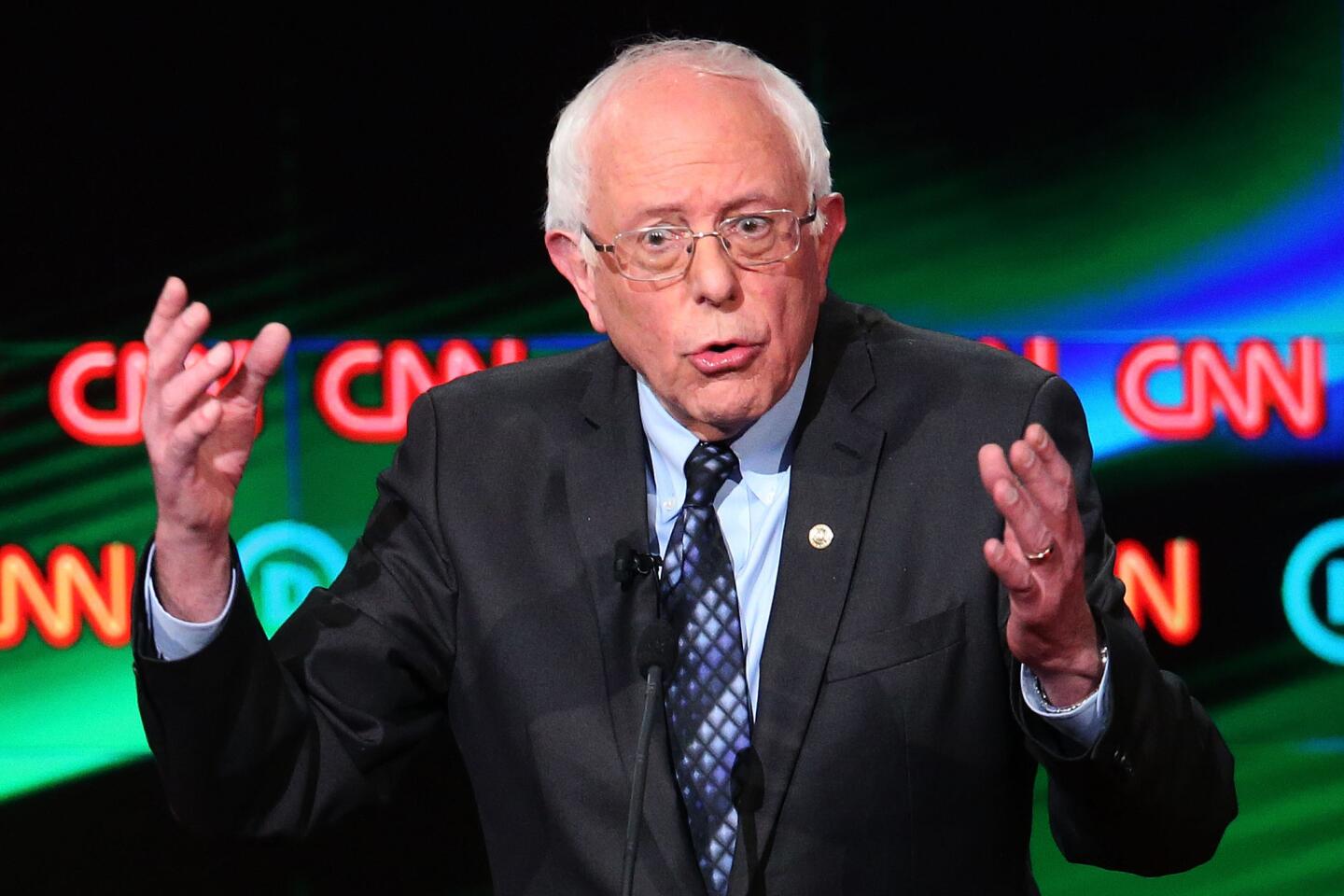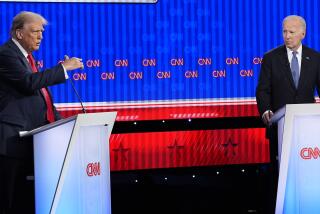Sanders, not going away quietly, puts Clinton on defensive in Democratic debate
Reporting from Flint, Mich. — Bernie Sanders made clear Sunday night that he is not about to ease up on Hillary Clinton in the interest of Democratic Party harmony — in fact, the Vermont senator seemed to be spoiling for a fight more than ever.
Clinton was repeatedly put on the defensive by her insurgent rival in a debate in Flint, where Sanders challenged her more personally and relentlessly than he has in previous matchups. If Clinton had hoped to use the nationally televised event as an opportunity to hone her attacks against Republican front-runner Donald Trump, Sanders made that impossible. He would not be ignored.
As voters in Michigan prepare to cast ballots in their primary Tuesday, Sanders is looking to make a defiant stand in the Rust Belt, seeing the region as fertile territory for his brand of economic populism and for a comeback in a race in which he is in desperate need of a big upset.
He mocked Clinton’s record on trade and Wall Street, casting her as a late — and opportunistic — convert to progressive economics.
TRAIL GUIDE: All the latest news on the 2016 presidential campaign >>
“Secretary Clinton supported virtually every one of the disastrous trade agreements written by corporate America,” he said, singling out the North American Free Trade Agreement reached by President Clinton’s administration in the 1990s — which, Sanders said, erased “tens of thousands of jobs” in the Midwest.
In contrast, Sanders offered his own early opposition to the proposed Trans-Pacific Partnership under consideration by Congress.
“I understood that these trade agreements were going to destroy the middle class of this country,” he said. “I led the fight against” them.
Sanders spent much of the evening relitigating the Bill Clinton administration, which could ultimately prove ineffective. Sanders raised a number of landmark Clinton initiatives that liberals in the party continue to resent: NAFTA, welfare reform, the signature 1994 crime bill. But Bill Clinton is very popular with Democratic voters, most of whom remember the 1990s fondly as a period of rising wages and prosperity.
Clinton bridled at Sanders’ repeated attacks on decades-old policies, saying she was looking forward, not backward, and he should be too. But she also offered a spirited defense of her husband’s record, noting the growth in job creation and rise in incomes.
The sparring between the two candidates is growing in intensity as polls show Clinton’s lead narrowing in a state that was once looked at by her supporters as an easy win. Sanders has been spending heavily in Michigan, and he is aiming to bounce off the momentum of weekend victories in Nebraska, Kansas and Maine into an upset.
But even as Sanders wins states, he still trails far behind Clinton in delegates, mostly because the biggest states are the most diverse, and Sanders has had trouble getting traction with minority voters. Clinton, for example, won overwhelmingly in Louisiana over the weekend, which offset the gains Sanders made elsewhere.
At the debate, Clinton forcefully defended her record on trade, saying she voted against the only multinational trade deal that was considered by the Senate during her time there, and touted her comprehensive plan of “carrots and sticks” to revitalize manufacturing in the Rust Belt.
And she hit Sanders hard on an issue that is deeply personal to Michigan voters: the bailout of the auto industry, which he voted against.
“You were either for saving the auto industry or you were against it,” she said. “I voted to save the auto industry. And I am very glad that I did.”
Sanders shot back that his vote was about not bailing out Wall Street.
“If you are talking about the Wall Street bailout, where some of your friends destroyed this economy,” he started to say, before Clinton interrupted, followed by lengthy shouting by both. “Excuse me, I’m talking,” Sanders said.
“Your story is ... voting for every disastrous trade agreement and voting for corporate America,” he said.
In addition to his critique of NAFTA, Sanders steered the discussion back into the 1990s by raising the welfare reform legislation championed by Bill Clinton.
“The poorest people of this country have become much poorer as a result of that,” he said.
Join the conversation on Facebook >>
Clinton’s rejoinder pointed to the limits of her husband’s power in office.
“Let’s get the facts straight,” Clinton said. “That bill had a lot of provisions that were stripped out by George W. Bush, by Republican governors.”
She said that had it been implemented as the Clintons hoped, the impact would not have been as harsh. But Clinton also made no apologies.
“If we are going to talk about the 1990s, let’s talk about 23 million new jobs,” she said.
Sanders wasn’t done.
“In the 1990s, you know what we also did?” he said. “We deregulated Wall Street, which allowed Wall Street to begin destroying our economy. … You are right. A lot of good things happened. But a lot of bad things happened.”
The two more often than not agreed in broad strokes on issues, particularly the water crisis that brought Flint into the national spotlight.
And at times during the exchange, both candidates put down their talking points and spoke in sometimes deeply emotional terms about race and religion.
They were challenged to confront their white privilege and explain blind spots when it comes to race.
“I never had the experience that so many people in this audience had,” Clinton said. “I think it’s incumbent on me … to urge white people to think what it is like to have ‘the talk’ with your kids, scared that your son or even daughter could get in trouble for no good reason and end up dead in a jail.”
Sanders talked about confronting his shock over a black colleague’s inability decades ago to hail a taxi in Washington because the experience was too humiliating, with the cabs driving by him because of his race. And he also spoke about working with activists from Black Lives Matter, who initially were skeptical of him but came to appreciate the effort he put into understanding their perspective.
“When you’re white, you don’t know what it’s like to be living in a ghetto,” he said. “You don’t know what it’s like to be poor; you don’t know what it’s like to be hassled when you walk down the street, or you get dragged out of a car.”
Sanders was asked about disappointment by some Jewish leaders that he tends not to highlight his ethnicity.
“I am very proud to be Jewish, and being Jewish is so much of what I am,” he said. “Look, my father’s family was wiped out by Hitler in the Holocaust. I know about what crazy and radical and extremist politics mean.”
And Clinton spoke in detail about the role faith plays in her political life.
“I pray on a pretty regular basis during the day because I need that strength and I need that support,” she said.
Sanders and Clinton also both condemned the poisoning of Flint’s water supply as a “dereliction” of duties by officials. Neither would say whether they thought Gov. Rick Snyder or others should go to jail, but Clinton for the first time joined Sanders in calling for Snyder’s resignation.
She also said the state and federal governments had the money to fix the problem.
“The state of Michigan has a rainy-day fund for emergencies,” she said. “What is more important than the health and well-being of the people? It is raining lead in Flint and the state is derelict in not coming forward with the money that is required.”
Despite their disagreements, the candidates noted the tenor of their race was in stark contrast to Republicans seeking their party’s nomination for president. Sanders noted that both had called for investing money on mental health. “And when you watch the Republican debates,” he joked, “you know why.”
Halper reported from Dearborn, Mich., and Memoli from Washington. Times staff writer Cathleen Decker contributed to this report from Flint.
ALSO
Donald Trump defiant as GOP leaders fight to stop him
Past Clinton drama: It’s why one black pastor wants Hillary Clinton to be president
Black votes matter up North too, giving Clinton an edge over Sanders in Michigan and beyond
More to Read
Get the L.A. Times Politics newsletter
Deeply reported insights into legislation, politics and policy from Sacramento, Washington and beyond. In your inbox three times per week.
You may occasionally receive promotional content from the Los Angeles Times.
